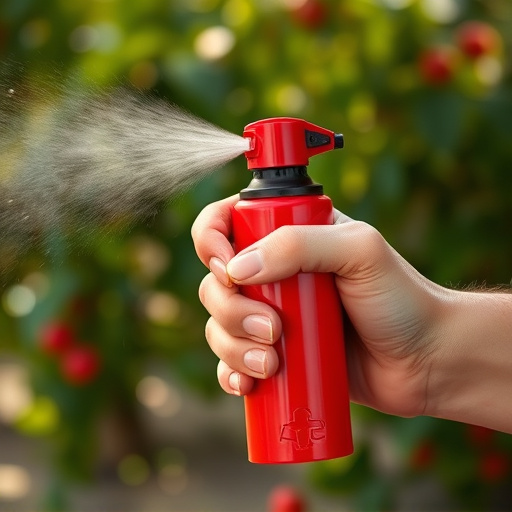Pepper spray, a non-lethal self-defense tool effective against various threats, including aggressive dogs, irritates eyes, nose, and respiratory system with capsaicin. Its effectiveness varies due to canine physiology and behavior, with repeated or prolonged exposure less impactful for some breeds or situations. Safety, local laws, and proper usage (close range, wind conditions considered) are paramount. Training ensures accurate deployment without endangering yourself or bystanders, acting within legal rights responsibly.
“Discover the power of pepper spray as a non-lethal self-defense tool, particularly effective against dogs. This comprehensive guide explores how pepper spray can deter aggressive canine encounters, offering insights into its effectiveness, safety, and legalities.
Learn about the mechanics behind pepper spray, its impact on dog senses, and the practical considerations for responsible use. Whether you’re a dog owner or simply aware of the risks, understanding Pepper Spray Defense Against Dogs could prove invaluable.”
- Understanding Pepper Spray as a Non-Lethal Tool
- Effectiveness Against Dogs: What to Expect
- Safety and Legal Considerations for Pepper Spray Defense
Understanding Pepper Spray as a Non-Lethal Tool
Pepper spray, often referred to as oleoresin capsicum (OC) spray, is a powerful non-lethal self-defense tool that has gained popularity for its effectiveness against various threats, including aggressive dogs. This spray is derived from the capsicum plant and contains capsaicin, the compound responsible for the burning sensation it causes. When deployed, pepper spray temporarily disables an attacker by irritating the eyes, nose, and respiratory system, providing users with precious time to escape or defend themselves.
In the context of dog attacks, a pepper spray defense offers a safe and effective solution without causing permanent harm. Unlike lethal force, which can have severe legal implications, pepper spray is designed to incapacitate temporarily, allowing the victim to seek help or diffuse the situation. Its non-lethal nature makes it an appealing option for individuals who want to protect themselves and their loved ones from potential dog aggressors while adhering to ethical and legal boundaries.
Effectiveness Against Dogs: What to Expect
When considering a pepper spray defense against dogs, it’s crucial to understand its effectiveness can vary significantly based on several factors. Pepper spray is designed to cause temporary blindness, coughing, and difficulty breathing in humans, and while it may have a similar impact on canines, their physiology and behavior make them less susceptible. Dogs have a thick nasal membrane that protects them from the spray’s full effect, and they are often driven by instinct rather than pain or discomfort, which can reduce its deterrence value.
In most cases, pepper spray can disrupt an attack by causing a momentary pause in a dog’s aggressive behavior. It may give the owner time to escape or summon help. However, it’s important to note that repeated or prolonged exposure might not be as effective, and some breeds with particular behaviors or sensitivity might require alternative non-lethal inflammatory tools for optimal protection.
Safety and Legal Considerations for Pepper Spray Defense
When considering a pepper spray defense against dogs, safety should be your top priority. Pepper spray is a powerful tool that can disable an aggressor temporarily, but it’s crucial to understand its limitations and proper usage. Always ensure you have a clear understanding of local laws regarding self-defense and the use of force. Some jurisdictions have specific rules for non-lethal tools like pepper spray, including restrictions on who can possess and carry them, as well as where and when they can be used.
Before using pepper spray to defend against a dog, consider factors such as distance, wind direction, and the presence of bystanders. Pepper spray is most effective at close range, and wind can affect its spread, potentially impacting unintended targets. It’s also important to train with the device to ensure you understand its activation mechanism and how to aim accurately without endangering yourself or others. Legal repercussions can arise from improper use, so always act within your rights and responsibly.
Pepper spray has established itself as an effective non-lethal inflammatory self-defense tool, especially in situations involving dogs. Its ability to immobilize and deter aggressive canines without causing permanent harm makes it a valuable option for personal safety. However, it’s crucial to understand its limitations and legal implications when considering a pepper spray defense against dogs. Always ensure you’re acting within the law and use force only as a last resort. With proper knowledge and responsible usage, pepper spray can be a game-changer in protecting oneself from potential dog attacks.
